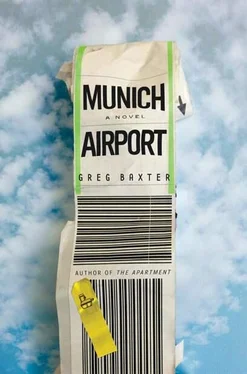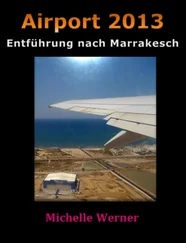You like soup? he said.
Soup?
Asian soup.
Sure, I said, though I did not want Asian soup. The moment he proposed it, I realized that what I wanted was a salad — I had been in Berlin for a few days and hadn’t had a single fresh vegetable. I was beginning to have constant indigestion during the daytime, which I suppressed with just enough alcohol in the evenings to forget that I felt a little sick. Otis took me to a busy and loud place that seemed deliberately half-refurbished, in a manicured state of collapse, and Led Zeppelin was playing, and it was full of people who were also named Otis. I ordered some soup and Otis got himself something to drink, a kind of lemonade with some mint and a thin layer of froth at the top, and we crammed into an overcrowded picnic table, opposite each other. I asked, When was the last time you talked to Miriam? He said, A long time, if you mean the last time we really talked. Me too, I said. My soup came. It was full of tofu and bok choy and chilies. I took a spoonful and Otis said, Is it good? I said, Yeah, it’s really good. Some people Otis knew came by and briefly spoke with him, in English. I was completely ignored, which was fine with me, because the only things I had to talk about were Miriam and the fact that I did something professionally that they probably all thought was evil. I ate my soup and did not even bother eavesdropping. When they left, I asked him if those people knew Miriam. No, he said. I felt like saying, If you want some books, Otis, you had better tell me something about Miriam, but instead I asked, Did you and Miriam ever date?
Date?
Or whatever.
He paused, and then he said, Not really.
I said, I saw her five years ago in Cologne, I knew then, I knew she was in trouble, she was so thin, but I didn’t do anything, I didn’t say anything.
I finished the last few spoonfuls of soup. He checked his watch a few times and dug in his pocket and jingled his keys, as though he was about to get up and go back to Miriam’s apartment. But I wasn’t ready. I said, What did she do for money? He said, She did a little bit of everything, taught English, movement therapy, life coaching, artist, translator, waited tables, got unemployment. He said this very casually and sleepily. But he awoke from the torpor of his list to lean forward and say — and as he spoke he hit the table hard once or twice with an outstretched index finger, and he revealed an aggression or rage that threatened to overflow from him — At no time in history have human beings had less freedom, less happiness.
I didn’t understand how this connected to Miriam’s work or to her death, unless he was suggesting that a lack of freedom and happiness had caused her to want to kill herself by starvation, or, alternatively, that her death was some form of courageous social protest. Possibly he was accusing me personally of taking Miriam’s freedom and happiness from her, or accusing both of us of doing that. I thought it was a preposterous thing to say, no matter what it meant, but I responded anyway. I said, At no time?
That’s right.
I bet that’s not true.
It’s true, he said.
I looked down. The empty bowl of soup was in front of me. I pushed it to the side. I stood up and Otis stood up, too. I said, I think I’m going to head back to my hotel, get some rest, come back to Miriam’s another day to finish sorting everything. He said, The books. Yes, I said, what about them? Some of them belong to me, he said, and some other stuff. I said, I don’t give a shit about the books, Otis, or anything else. Before we leave, you can come over and take whatever you like. He thanked me and we exchanged numbers. He said he’d see me tomorrow, or whenever I returned to Miriam’s, and I sensed that he was telling me I would never get to spend time in Miriam’s apartment without him finding out and joining me. I reminded him about getting Miriam’s friends together, something modest but sincere, to mark the occasion. We parted in front of the soup place, but we were both heading in the same direction. I waited until he was out of sight, then I followed. I went back to my bike. The ride back across town, in the snow or freezing drizzle, whichever it was, was slippery and frigid. I got back to the hotel and took another shower and a short nap. I heard my father come in. I went to his room and told him that a neighbor of Miriam’s had explained to me that human beings have never had less freedom and happiness than now. He sat on the edge of his bed and undid his tie and started taking off his shoes. What on earth is that supposed to mean? he said. I don’t know, I said. I suspect he’s forgotten the tenth century, said my father. I suspect you’re right, I said. I sat on the little yellow tulip chair in his room and started flipping through a complimentary tourism magazine.
The lodge, in Scotland, where my mother and father honeymooned, is way up in the Highlands, pretty remote, and luxurious. It stands on a tiny little island near the shore of a lake, and long ago they built a land bridge out to it, wide enough for a narrow road. It’s at the bottom of a valley. When you arrive, by car — though some arrive by helicopter — and come down into the valley, you can usually see smoke coming out of the chimneys, or at night you can see the distant lights that make it seem as though a ship is in the water. Inside, there are numerous little rooms where fires burn, where you find soft chairs and isolation, and where you can sit and read a paper or a book for a long time and get a pot of tea served to you. The restaurant is very good. The view is nice. Most of the people who go there are older, and they have been coming for years and years and years. I don’t know how my mother and father found it. They went three times together — the honeymoon, again when Miriam and I were young, and again when I was a teenager — though we never came with them. I know they had plans to return, and after my mother got sick they contemplated going again. But she was too tired to travel. So they waited and put their faith in her recovery. A few years after she died, my father decided we ought to have regular reunions there. I knew that he would have preferred to have regular reunions at home — home was where he wanted us — but he also knew it was easier on me if he came to Scotland, and a little more likely that Miriam might come. He paid for me and my wife to come meet him one year. He invited my wife’s parents, but they couldn’t make it. He invited Miriam, but Miriam was too busy. He accepted it. The three of us had a nice time together. My father asked for the wine he and my mother drank the last time they were there — a Bordeaux that cost about seventy pounds a bottle — and we got quite drunk on that wine. We sat in one of the booths, under the red lampshades, listening to somebody play a piano, and we talked about our flat in Fulham Broadway, how we were slowly modernizing it, first the bathrooms, then the kitchen, about when we might next visit him in the States — my wife never did come with me — and if we were thinking about having children. My wife said she wanted children. I said I wanted children. I even think we decided to start trying to have children after that trip to the lodge. The dinner lasted forever. It was summer, so the evening had some light in it all the way to midnight. We were the last people in the restaurant, and afterward my father and I went for a little stroll down the land bridge and around the lakeshore. My wife went to bed. The stars came out. My father said to me, Why do you think Miriam hasn’t come? I said, You said she told you she was too busy, I guess that’s the reason. He said, Yes, still, it’s a pity. Maybe next time, I said. Yes, he said, maybe next time. Eventually we went to bed.
Leaving the airport bathroom, I am a little less tired. I must have slept, for a moment, standing up. Or else it is the effect of the spaciousness of the terminal, after fifteen minutes in a cubicle. The hunger and the nausea have passed completely. I feel almost as though I have exercised, that I have not walked out of a busy airport bathroom but from the men’s dressing room of a gym. I half expect to see Richard standing here to say hello, standing with that lean of his, which masks his sloped shoulder. Perhaps he waited for a few minutes. Perhaps he got tired of standing in a busy spot.
Читать дальше











